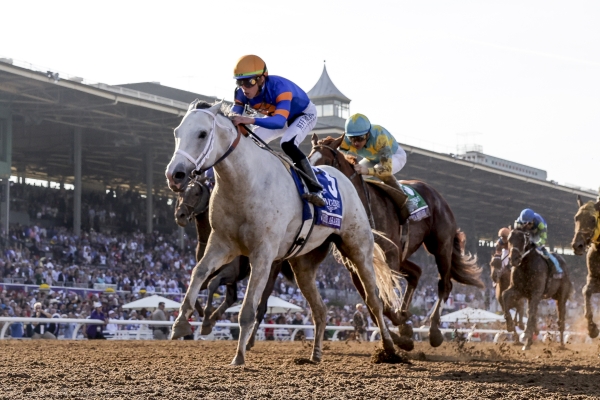Industry Frontrunner: Drew Fleming ’05 As CEO and president of the Breeders’ Cup, Fleming has taken the lead in creating national safety standards in the horseracing industry.
Washington and Lee University attracted Drew Fleming ’05 from the beginning for its strong academics and liberal arts education. Unsure of what career he wanted to pursue, he majored in biology, as he considered going to medical school; however, upon graduation, he ultimately chose to attend law school at the University of Kentucky. Staying in his home state, he worked in the mergers and acquisitions field, with an emphasis on the equine industry. He left the law field in 2016 to work for the Breeders’ Cup as senior vice president of business and development, becoming CEO and president at the end of 2019.
“The value of taking many different subjects makes you a more well-rounded person and more prone to success in whatever career path you choose,” he says. “As an executive in the sports industry, you have to have business acumen; you have to have a strong financial background; you have to understand public relations and media rights. Taking a lot of those courses in multiple subject areas at Washington and Lee helped develop me as a person.”
Known as the “richest two days in sports,” the Breeders’ Cup consists of 14 thoroughbred races worth $33 million. The event, held over two days in the fall, changes locations each year within the U.S. and serves as the year-end championship. With 80 qualifying races spanning 11 countries and five continents, the Breeders’ Cup brings together people from around the world.
“The Breeders’ Cup is the perfect marriage between the Super Bowl and track and field in the Olympics,” says Breeders’ Cup CEO and President Drew Fleming ’05. “Just like track and field, we have races run at long and short distances, dirt and turf surfaces, male and female, and young and old.”
A few months after Fleming assumed the helm, the pandemic brought the sport to a halt. As a member of the White House COVID-19 Task Force Sports Committee, Fleming worked on ways sporting events could continue.
“In such a trying time for our country and abroad, horse racing was uniquely positioned to continue safely during much of the pandemic when many sports couldn’t,” Fleming says.
Simultaneously, he worked with other industry leaders to create and pass the 2020 Horseracing Integrity and Safety Act, the most groundbreaking piece of legislation to affect racing in the last century. Before, horse racing was regulated on a state-by-state basis. Not only did this make the sport confusing for spectators — imagine a touchdown counting for three points in Virginia and six points in California — it impacted the welfare of the animals. With the industry under a microscope, Fleming believed nationwide change needed to occur.
“The current system was not working; there were fragmented decisions and integrity issues,” Fleming says. “Unlike most other major sports where they have official leagues and commissioners, racing lacks that because of how old it is. This was the first step in creating a more formal league concept, where safety and integrity would be uniform across the United States.”
The act led to the creation of the Horseracing Integrity and Safety Authority (HISA), an independent organization that enforces rules on anti-doping, medication control and track safety.
In addition, Fleming sits on the board and executive council of the International Federation of Horseracing Authorities and the National Thoroughbred Racing Association and the Thoroughbred Safety Coalition boards. In 2022, Sports Business Journal named him to its 40 Under 40 list.
“That’s something I’m really proud of,” Fleming says. “Not only does it really recognize success in the sports industry, but it also positions thoroughbred racing at the same level as the NBA and the NFL, and to be included in those distinct groups representing thoroughbred racing that was very special.”
W&L Magazine Summer 2024
 Drew Fleming ’05
Drew Fleming ’05 White Abarrio, with jockey Irad Ortiz Jr., won the $6 million Longines Breeders’ Cup Classic in 2023 at Santa Anita Park in Arcadia, California.
White Abarrio, with jockey Irad Ortiz Jr., won the $6 million Longines Breeders’ Cup Classic in 2023 at Santa Anita Park in Arcadia, California.
You must be logged in to post a comment.